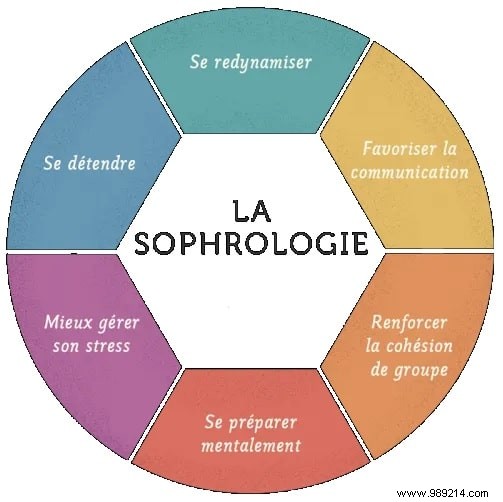Sophrology, which means "the study of conscious harmony", is a holistic system comprising physical and mental exercises that promote health, well-being, relaxation and alertness. Founded in the 1960s by Alfonso Caycedo, a professor of psychiatry and neurology in Madrid, sophrology was first created to treat veterans suffering from PTSD and depression. If today sophrology is widespread and its practitioners report real health benefits, there is still not enough scientific evidence to rigorously validate or invalidate its effectiveness.
Caycedo combined techniques from Zen, yoga and Buddhist meditation. Caycedo also included hypnosis and relaxation to create a system for participants to release and redirect difficult emotions. A sophrologist leads each session. There are 12 levels of practice which start very basic and gradually deepen as the practitioner advances. Sessions can include a guided body focus, visualizations, exercises called dynamic relaxation, and more depending on the needs of the individual.
During a classic exercise, you sit down or keep your eyes gently closed while the sophrologist explains a series of basic exercises, starting by focusing on each part of the body. After that, the sophrologist will guide you to focus on a particular topic. For example, during a sophrology consultation, you may be asked to notice how the body feels calm, so that you can reproduce the physical sensations of this calm more often in your daily life.
With regular training, these desired states of being gradually integrate into your daily life. Sophrology exercises can be described as a “virtual training program”. During the sophrology exercise, you can be guided to work on specific themes, such as improving performance in public speaking, exams, sports competitions as well as in relationships with partners, children, colleagues and more. Sophrology exercises aim to strengthen and improve all capacities.

Practitioners generally report feeling more peaceful, confident and happy. Sophrology is also used for:
Sophrology techniques can be helpful during medical procedures that cause stress and discomfort. In a small 2018 study with 60 participants, people with cancer used sophrology and hypnosis techniques during interventional radiology procedures.
The group that engaged in relaxing therapies showed a significant reduction in levels of anxiety and pain, compared to their levels before the procedure and the control group that received no treatment. Participants were guided to focus on their breathing and positive memories to generate a relaxed mental state of hypnosis.
Sophrology practices can benefit pregnant women and their newborns. A 2019 study concluded that a type of sophrology childbirth training that included breathing, Kegel, and Lamaze techniques had a positive effect on:maternal health, pelvic floor function, and well-being. be general. The women showed a better rate of vaginal delivery and lower levels of urinary incontinence and postpartum hemorrhage. Newborns of mothers who underwent sophrology had higher Apgar scores and body weights than the control group.
Although these results are promising, more research on the true impacts of sophrology is needed. Indeed, if marginal studies seem to indicate real benefits, concrete scientific evidence validating the method as a whole is still lacking.
However, there is no shortage of scientific literature dedicated to sophrology. Based on medical data published on PubMed , more than 200 references have sophrology as their main subject. However, the meta-analysis of these publications shows that, in the vast majority of cases, the methodology adopted is insufficient and lacks rigour.
The absence of control groups is predominant, and represents a significant methodological bias. The control group is essential when it comes to evaluating the specific effectiveness of a therapeutic practice or method. The absence of such an element prohibits, on its own, to rule on the possible real benefits of sophrology. In addition, the absence of a blinding procedure is also commonly seen in experimental protocols.
In the current state of the elements available to science, no study has rigorously demonstrated the effectiveness or lack of effectiveness of sophrology. Future experimental frameworks hoping to demonstrate the validity of this discipline will have to integrate the methodology necessary for the analysis of any therapeutic procedure.